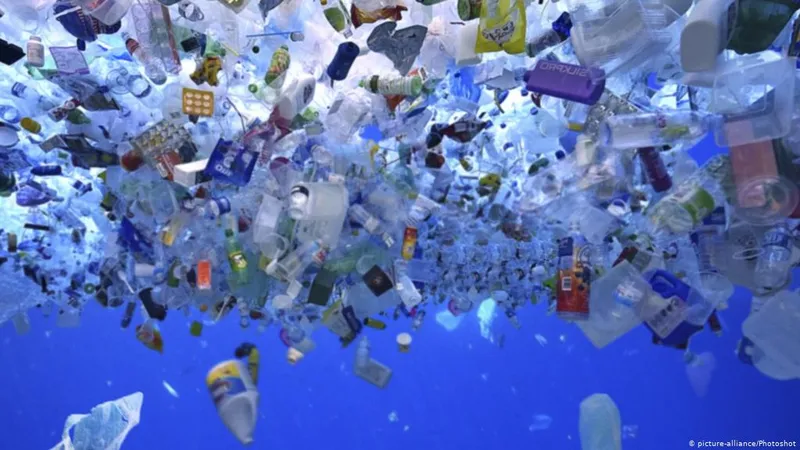[World Oceans Day] A blue planet for a green world
Did you know that ocean-based industries are expected to employ 40 million people by 2030? From powering the economy to saving the planet, here's why we need to save our marine resources
The image of a blue marble floating in the space is a subtle reminder of one of the most underappreciated facts about our planet. The 71 percent water cover is one of the fundamental reasons for life on our planet. Thus, to raise awareness through observance the UN General Assembly through its resolution 63/111 of December 5, 2008, designated June 8, 2022, as World Oceans Day. Today, World Oceans Day supports a global network in over 140 countries, with a focus on protecting at least 30 percent of oceans by 2030.
This is important as oceans are facing severe threats, acidity levels of oceans have gone up by 26 percent since the industrial revolution, coastal eutrophication is expected to increase by 20 percent by 2050, and so on. If we can take immediate action to reduce threats and restore ocean systems, we can ensure that we continue to receive benefits such as climate regulations, water security, clean air, and food security.

We have managed to create an island of plastic now referred to as the Great Pacific Garbage Patch, which is three times the size of France.
The role of oceans in the world economy generally goes unnoticed. It is estimated by Organization for Economic Co-operation and Development (OECD) that the value generated by oceans is likely to double from 1.5 trillion in 2010 to three trillion by 2030. Further, ocean-based industries are expected to employ 40 million people by 2030. Be it ocean transport or the fishing industry, medicinal resource to recreation, oceans are part of our lives in more ways than we acknowledge.
Take climate regulation, for example, oceans transport heat from the equator to the poles, produce over 50 percent of the oxygen we breathe and store 50 times more carbon dioxide than our atmosphere, somewhere to the tune of 10 gigatonnes of carbon per year.
Oceans provide at least 16 percent of all animal protein consumed globally. Research by Lindsey and Dahlman suggests that “more than 90 percent of the excess heat trapped in the Earth system due to human-caused global warming has been absorbed by the oceans”.
Oceans are homes too. They offer 90 percent of the habitable space on our planet and harbour over 250 thousand species, with two-thirds of marine species still unidentified. They are home to a variety of life - from the tiniest bacteria to the world’s largest mammal – the blue whale.
Many marine species are highly fascinating like:
- some jellies that produce light by themselves
- the bizarre pearlfish that live in the anus of a sea cucumber and also eats its gonads
- the sunfish that lay 300 million eggs in one go
- some isopods enter fish mouths, eat the tongue, and replace it with themselves
There is no end to knowing how fascinating oceans are and how critical they are for human wellbeing; but the world’s oceans are facing huge threats and it is time that we take greater action for the protection of our oceans. India is a signatory nation to the Convention on Biological Diversity – 1992 and has committed to protect at least 10 percent of its marine areas. India has made several pledges to conserve the ocean; however, much more is needed in terms of action from individuals and organizations.
For instance, HCL Group and UNLEASH, a global innovation program for the UN Sustainable Development Goals (SDGs), announced a year-long collaboration to mobilize youth and develop innovative solutions to promote aquatic ecosystem conservation.
Here are a bunch of things one can do to protect the environment:
- The lowest hanging fruit is signing the pledge by participating in the 30X30 (protecting 30 percent of oceans by 2030).
- You can plan an event around the World Ocean Day, there are toolkits available online for the same, you can even submit your event to worldoceanday.org and list your event on the global map.
- There are ready to use posters that you can put up on social media and other platforms for garnering more support, you can screen films, organize events, and engage various sections of the society.
- If all of this is too much effort, find an event around you and participate, have fun, enjoy the ocean, go surfing, diving, snorkelling, or build sand castles and make sand sculptures on the beach if you can and take your family and friends along.
- If you are far from the coast and still want to make more contributions, you can follow the recommendation on some of the Instagram pages like knowyourfish and inseasonfish to know how you can eat fish more responsibly.
- Use less plastic, plastic waste travels from your trash to the oceans and eventually inside your body, causing tremendous harm at each stage. We have managed to create an island of plastic now referred to as the Great Pacific Garbage Patch, which is three times the size of France.
The Habitats Trust that I represent has started a marine conservation programme focusing on issues related to oceans. We are working to protect the coral reefs of India and the plights of the fisheries sector. Also, in partnership with the Jane Goodall Institute India, we have launched the ‘Oceans are Us’ programme for kids.
Over 44 percent of the world's population resides within 150 km of the coast, and are in more than one way dependent on the coast. But this does not mean that the other 56% has no connection to the oceans. We all are heavily dependent on the oceans for every fundamental need. Thus, every one of us has to pitch in, the list of things to do is endless and urgent. No matter where you are, this World Oceans Day, let us all contribute to te saving our oceans.
(Disclaimer: The views and opinions expressed in this article are those of the author and do not necessarily reflect the views of YourStory.)
Edited by Diya Koshy George

![[World Oceans Day] A blue planet for a green world](https://images.yourstory.com/cs/5/f5a7f3304b1211e9b6645b8ae897d03e/Screenshot2022-06-08at11-1654669225621.png?mode=crop&crop=faces&ar=16%3A9&format=auto&w=1920&q=75)





